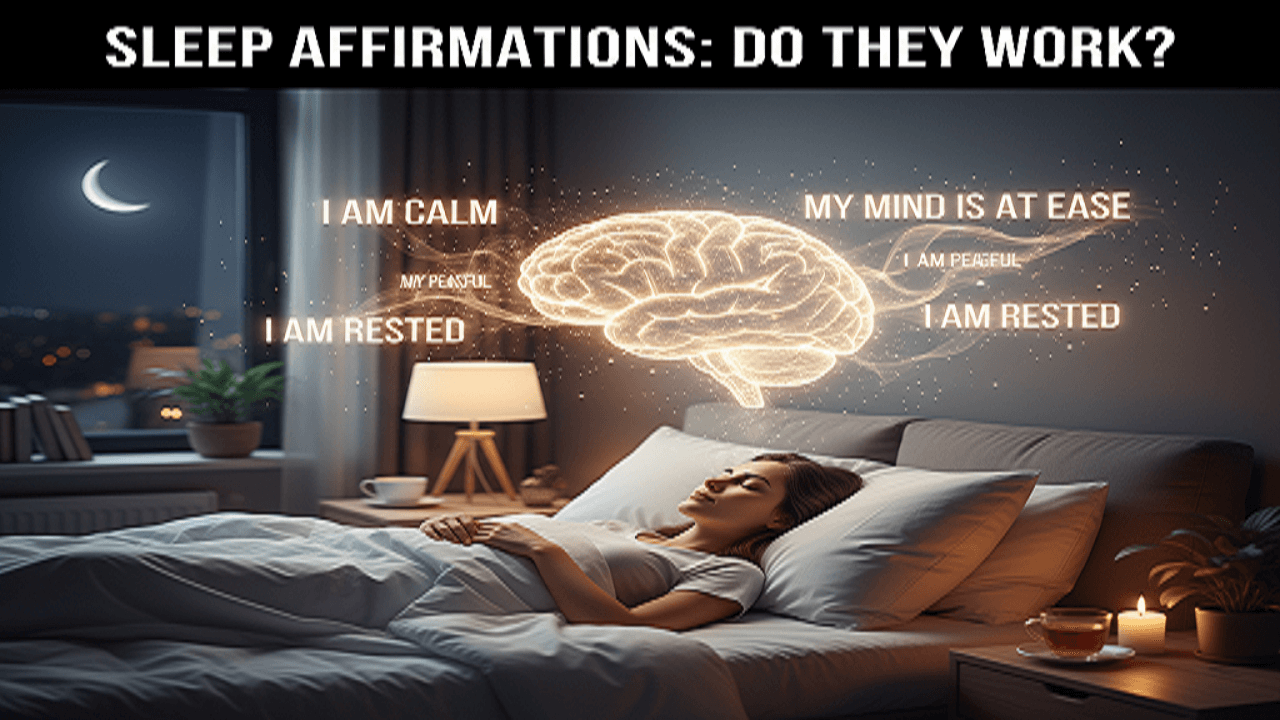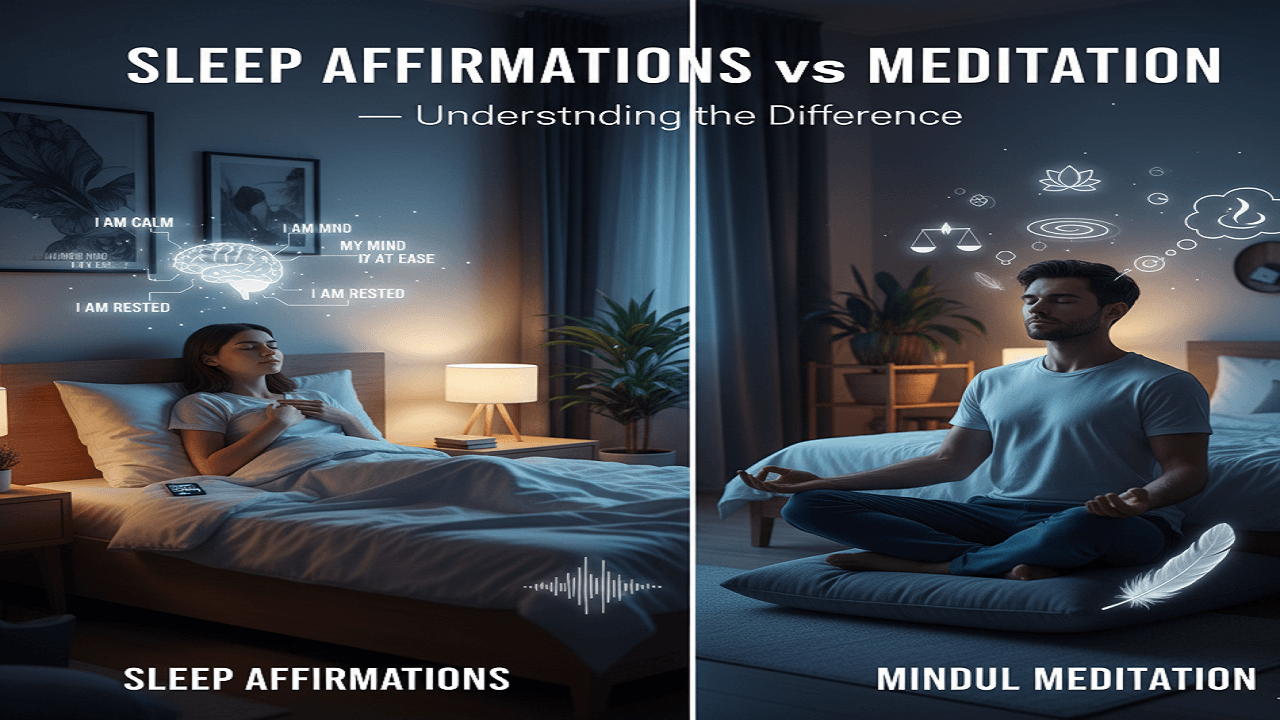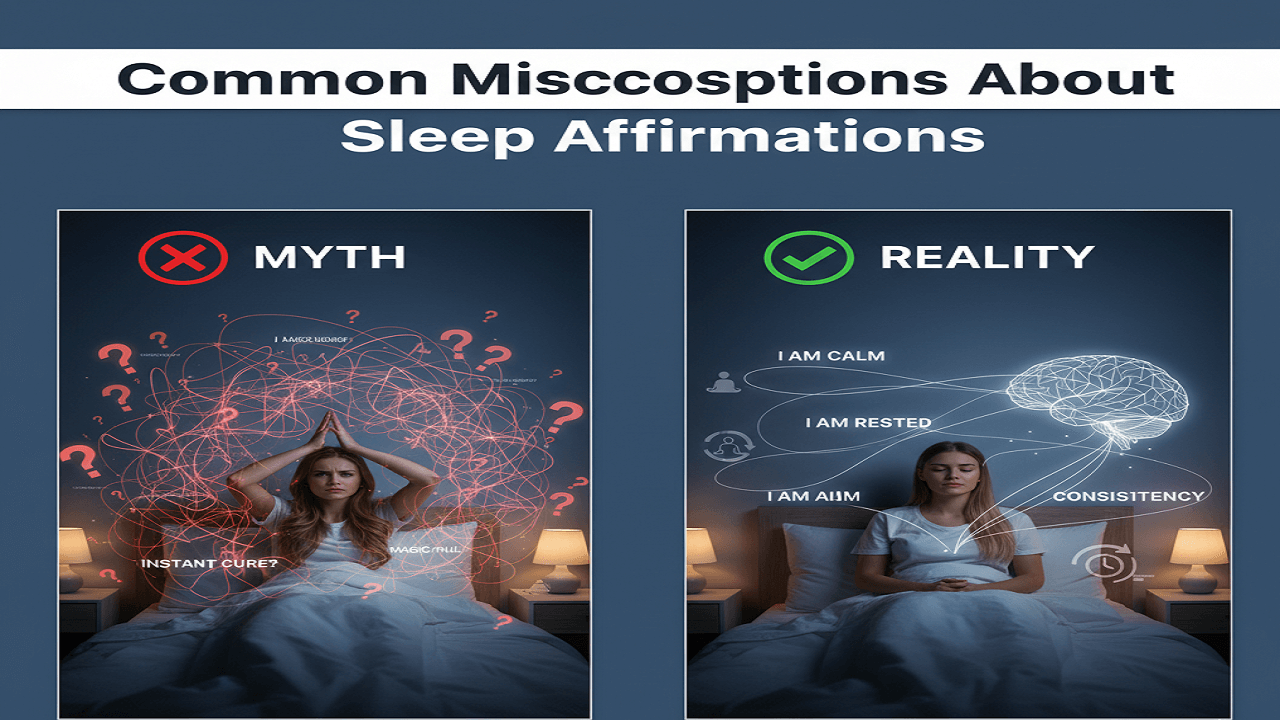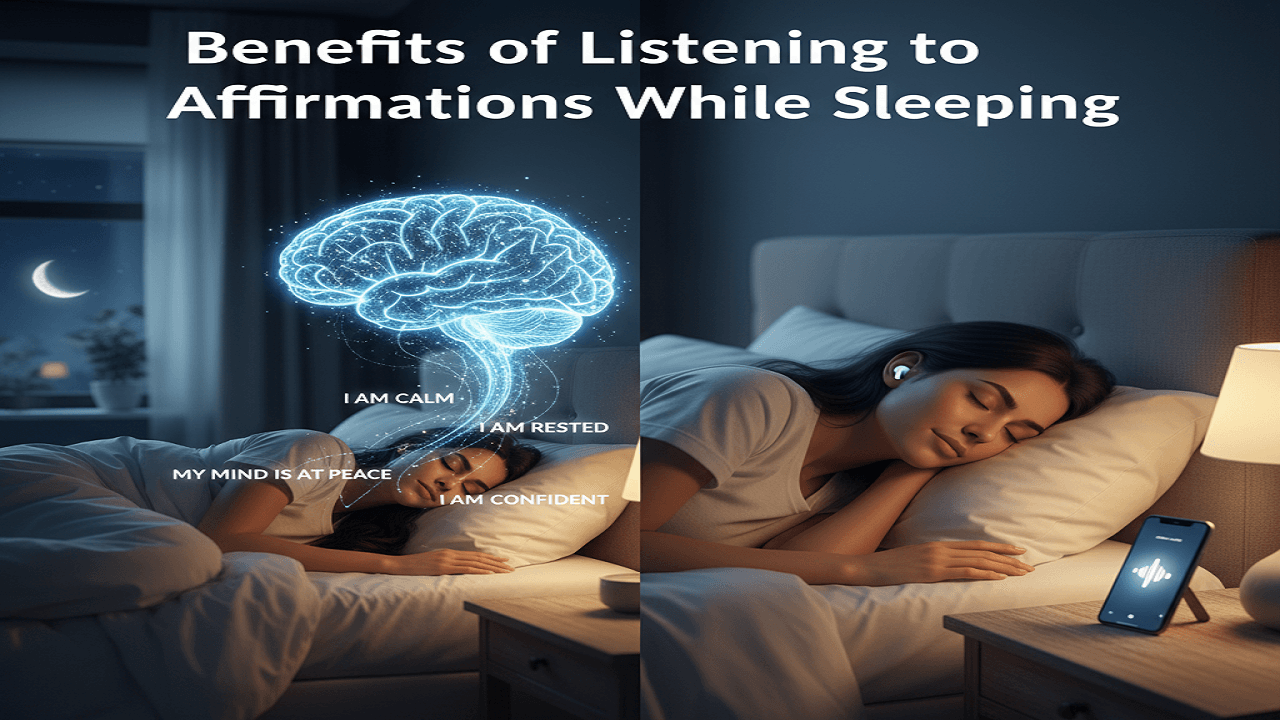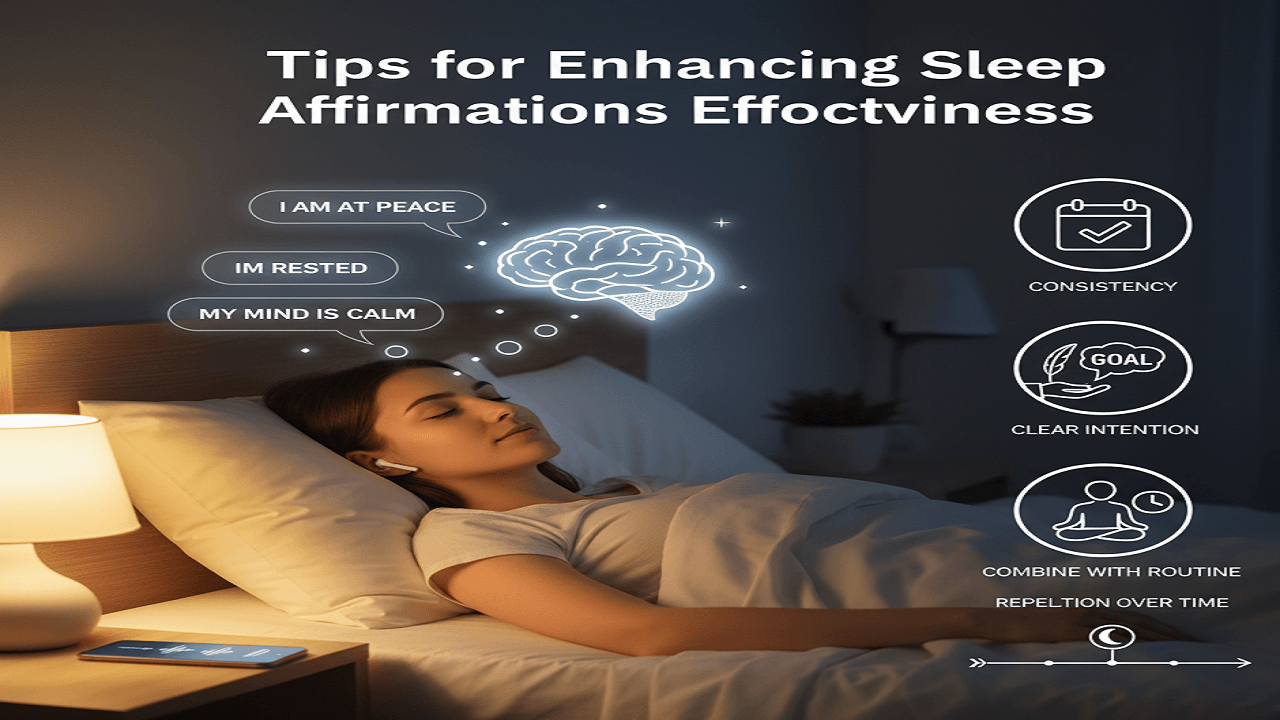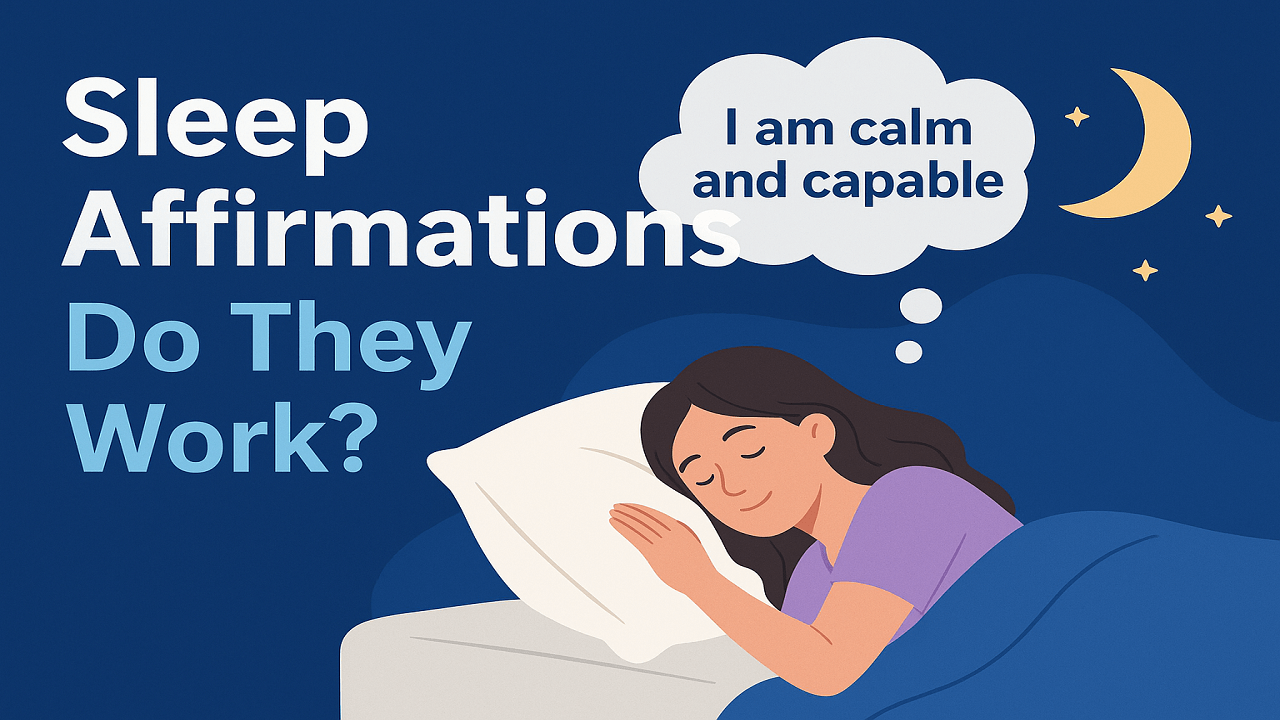Have you ever wondered if repeating positive statements before bed could reshape your thoughts or even your life? Sleep affirmations are designed precisely for that purpose. They’re short, powerful phrases you listen to or repeat as you fall asleep to help reprogram your subconscious mind with optimism, confidence, and self-belief. Many people claim that listening to affirmations while sleeping helps them wake up feeling calmer, more motivated, and emotionally balanced.
But do sleep affirmations actually work? The idea behind them is simple yet fascinating. While we sleep, our conscious mind takes a break, allowing the subconscious to absorb new ideas and emotions more easily. During this stage, affirmations can subtly influence our internal beliefs, shifting how we think and act upon waking. Supporters claim that this nightly practice can boost self-esteem, attract positive experiences, and even improve sleep quality.
Still, it’s essential to ask: Does listening to positive affirmations while sleeping work for everyone? While results can vary, many users report noticeable changes in their mood and mindset over time. Like any self-improvement technique, consistency and emotional engagement are key. In the sections that follow, we’ll explore how sleep affirmations function, what science says about them, and practical steps you can take to use them effectively for personal growth and restful sleep.
Table of contents
2. The Science Behind Listening to Affirmations While Sleeping
To determine whether sleep affirmations are effective, it is helpful to examine what happens in the brain during sleep. During deep sleep and REM stages, your conscious mind relaxes, allowing your subconscious mind to become more receptive. This is the same part of your brain responsible for automatic behaviors, beliefs, and emotional responses. When you repeat or play positive affirmations while sleeping, you’re essentially feeding your subconscious a new narrative — one that replaces self-doubt with confidence and negativity with calm.
But does listening to affirmations while sleeping work from a scientific standpoint? Research in psychology and neuroscience suggests that it can — under certain conditions. Studies on neuroplasticity demonstrate that the brain continues to form new neural connections even during periods of rest. Floating words or soft icons like stars, moon, and gentle sound waves to hint at audio affirmations.
A 2014 study published in Frontiers in Psychology found that individuals who practised self-affirmation exhibited increased activity in brain regions associated with self-processing and positive valuation. This means that when you engage with affirmations — even subconsciously — you may be enhancing your brain’s ability to adopt empowering beliefs and resist stress.
However, like any personal development tool, sleep affirmations are not a magic solution. Your subconscious mind absorbs messages more easily when you also take conscious actions aligned with your affirmations. For instance, if you repeat “I am confident and capable” at night but avoid opportunities to demonstrate confidence during the day, your results may remain limited.
In short, do affirmations while sleeping work? Yes, but only when paired with consistency, a strong belief, and a daily intention. The science shows promise, but your mindset and lifestyle choices determine how effective those late-night mantras truly become.
3. Sleep Affirmations vs Meditation — Understanding the Difference
Many people confuse sleep affirmations with meditation, but the two practices serve very different purposes. While both aim to calm the mind and promote inner peace, their methods and outcomes diverge significantly. Meditation focuses on awareness of the present moment — observing your thoughts without judgment. In contrast, affirmations are about shaping your future by planting new, empowering beliefs into your subconscious.
When you meditate, your goal is to quiet your mental noise and achieve a state of balance. When you practice listening to affirmations while sleeping, you’re programming your mind with intentional thoughts, such as “I am confident”, “I am worth”,“ I am at peace”.“ The idea is not to silence your thoughts, but to replace negative self-talk with affirming statements that support your goals and emotional well-being.
So, do affirmations while sleeping work better than meditation? Not necessarily — they complement each other. Meditation helps clear your mental space, making it easier for affirmations to take root. Many experts recommend meditating before bed to release tension, then listening to sleep affirmations as you drift off. This combination strengthens your mind’s receptivity and reinforces the positive messages you want to internalise.
If your primary focus is reducing anxiety or improving sleep quality, meditation may be more effective initially. But if your goal is personal growth, self-confidence, or manifesting new outcomes, pairing both techniques can be a potent formula. Together, they help train both your conscious and subconscious mind to work toward the same positive direction — one thought, one night at a time.
4. Do Sleep Affirmations Really Work? The Evidence Explained
So, do sleep affirmations work, or are they just another self-help trend? The answer depends on how you use them — and what you expect from them. Research into the connection between the subconscious mind and verbal repetition suggests that affirmations can influence our perception of ourselves and the world around us. When you regularly listen to affirmations while sleeping, your brain starts to internalise those positive statements, subtly altering your mindset and daily behaviour.
One of the key ideas behind affirmations is self-suggestion — the process of feeding your subconscious mind new beliefs through repeated exposure to them. During sleep, when your conscious filters are quiet, your mind is more open to these suggestions. This explains why some people experience better focus, self-esteem, and motivation after a few weeks of nightly affirmations. They’re not just hearing the words; they’re slowly replacing old, limiting beliefs with empowering ones.
Still, it’s essential to maintain realistic expectations. Does listening to affirmations while sleeping have an overnight effect? Probably not. Actual change takes time, consistency, and emotional engagement. You can’t play a recording and expect miracles. Instead, think of affirmations as a mental conditioning tool — like exercise for your brain. The more consistently you train your thoughts, the stronger your self-belief becomes.
So, do affirmations while sleeping work? Yes, they can — especially when combined with conscious effort. Use affirmations that feel personal and believable, and pair them with real-world actions that align with your goals. For example, if your affirmation is “I am financially secure,“ practice responsible budgeting or pursue new income opportunities during the day. When belief meets behaviour, transformation follows.
In essence, sleep affirmations are most effective when used as part of a comprehensive self-improvement routine. They can’t replace discipline or action, but they can help you think, feel, and act from a place of confidence and positivity — even before you open your eyes in the morning.
5. How the Subconscious Mind Reacts During Sleep
A serene, dreamy night scene with soft, gradient blues and purples to evoke a peaceful sleep. While your conscious mind rests, your subconscious remains alert and active — processing emotions, memories, and experiences. This unique state makes listening to affirmations while sleeping potentially a powerful experience.
When we sleep, our brain cycles through different stages, including REM (Rapid Eye Movement) and non-REM phases. During non-REM sleep, especially in the lighter stages, the brain becomes more receptive to auditory input. This means that soft, repetitive affirmations can slip beneath the conscious barrier and reach your subconscious mind.
Science backs this up. Studies in neuroscience show that even while asleep, the brain continues to register and respond to external sounds. This is why some people wake up when their name is mentioned or why a mother reacts instantly to hebaby’s’s cry. Similarly, when you repeatedly hear positive affirmations such as “I am calm “,” I am confident “, “I am enough“, your subconscious begins to treat these statements as truths.
However, the key to effectiveness lies in consistency and repetition. Does listening to affirmations while sleeping work after one night? Unlikely. However, when practiced over several weeks, your subconscious slowly rewires itself, replacing negative thought patterns with new, empowering beliefs. It’s essential to remember that your subconscious mind doesn’t distinguish between real and imagined experiences. That’s why affirmations while sleeping can influence your emotional state and behavior — because your mind accepts them as reality. Over time, this mental conditioning can improve your self-esteem, motivation, and overall outlook on life.
In short, listening to affirmations while sleeping taps into one of the brain’s most powerful functions: its ability to reprogram itself. By feeding it positive, goal-oriented messages during rest, you’re nurturing a mindset that supports growth, confidence, and calmness.
6. Benefits of Listening to Affirmations While Sleeping
Many people wonder, “Do sleep affirmations work, and what can they actually do for me?“ The truth is that listening to affirmations while sleeping can have a wide range of benefits — both mental and emotional. When used consistently, they can help reshape your mindset, boost confidence, and improve your sense of inner peace.
1. Reprograms Negative Thought Patterns
One of the most remarkable effects of sleep affirmations is their ability to reprogram limiting beliefs. During sleep, your subconscious is more open to new ideas. By exposing it to positive statements like “I am worth”,” I attract success”, you’re slowly replacing internal negativity with self-supportive thoughts. Over time, this mental reprogramming becomes second nature.
2. Reduces Anxiety and Improves Sleep Quality
If stress or overthinking keeps you awake, listening to affirmations while sleeping can help calm your mind. Repetitive positive phrases act like a form of guided meditation, lowering your heart rate and easing tension. As a result, you may fall asleep faster and wake up feeling refreshed and balanced.
3. Boosts Confidence and Motivation
Do affirmations while sleeping work for self-confidence? Absolutely. Hearing positive statements like “I believe in myself“ during rest reinforces your sense of worth. When you wake up, you carry that energy into your day — approaching challenges with renewed focus and optimism.
4. Supports Emotional Healing
Affirmations can also promote emotional recovery by nurturing feelings of safety, forgiveness, and acceptance. Whether you’re overcoming heartbreak, failure, or self-doubt, these nightly messages can help shift your emotional vibration toward a state of peace and gratitude.
5. Encourages a Positive Morning Mindset
One underrated benefit of listening to affirmations while sleeping is how it sets the tone for your mornings. You wake up already primed with a sense of positivity and determination, like starting the day with a mental boost before even opening your eyes.
6. Strengthens the Mind-Body Connection
Because thoughts influence emotions, and emotions affect the body, sleep affirmations can contribute to overall well-being. By reinforcing calmness, confidence, and self-love during sleep, you may notice improved focus, reduced stress symptoms, and even enhanced posture and energy levels throughout the day.
In essence, does listening to affirmations while sleeping work? Yes — when done regularly and with intention, the benefits go beyond mere words. They can gradually shift how you think, feel, and act in powerful, life-affirming ways.
7. Common Misconceptions About Sleep Affirmations
Even though more people are discovering the benefits of listening to affirmations while sleeping, several misconceptions still surround this practice. Clarify the most common ones so you can approach sleep affirmations with realistic expectations and a clear understanding of their benefits.
Sleep Affirmations Work Instantly
Many beginners expect immediate results and feel discouraged when they don’t notice changes overnight. But do sleep affirmations work instantly? Not quite. Just like physical exercise, affirmations train your mind over time. They need consistent repetition to reshape deeply rooted beliefs. Think of them as planting seeds — you must nurture them before they grow.
You Don’t Have to Believe in Them
Another misconception is that it doesn’t matter. While your subconscious mind absorbs information even when you’re asleep, your conscious belief in the process amplifies the effects. If you trust that listening to affirmations while sleeping can help, your brain is more receptive to the positive messages.
All Affirmations Work for Everyone
Not every affirmation fits every person. For example, saying “I am a millionaire” might feel unbelievable to someone struggling financially. Instead, start with smaller, realistic statements, such as “I am improving my financial situation.“ Tailoring your affirmations to your current mindset increases their impact.
You Can Skip Conscious Effort
One of the biggest misunderstandings about whether listening to affirmations while sleeping works is that it can replace real action. In truth, affirmations support your goals — they don’t achieve them for you. You must pair them with conscious effort, positive habits, and daily choices that align with your statements.
The Effects Are Only Psychological
Some critics argue that affirmations have no lasting impact beyond the realm of “feel-good“ psychology. However, studies in neuroscience and cognitive-behavioural therapy show that repeated positive self-talk can physically alter neural pathways in the brain. That means sleep affirmations don’t make you feel better — they can gradually rewire how you think and respond to life’s challenges.
By understanding these misconceptions, you can set realistic expectations and use affirmations as a valuable self-development tool rather than a magical fix. Remember, do affirmations while sleeping work? Yes — but only when paired with patience, practice, and intention.
8. How to Use Sleep Affirmations Effectively (Step-by-Step Guide)
Understanding whether sleep affirmations work is one thing — but using them effectively is another. To truly experience their benefits, follow a few simple yet powerful steps. Here’s how to make the most out of listening to affirmations while sleeping for maximum impact.
Choose the Right Affirmations
Start by selecting affirmations that feel authentic and relevant to your goals. Whether it’s improving confidence, attracting abundance, or finding peace, choose statements that resonate deeply with you. Instead of vague phrases like “I am successful”, try something more specific, such as “I am confidently taking steps toward success.“ Personal connection strengthens subconscious acceptance.
Use a Calm, Soothing Audio Source
Since you’ll be hearing affirmations at night, it’s best to use recordings with a gentle voice and soft background music, avoiding high-volume or overly energetic tones, as they may disrupt your sleep. You can record your own affirmations or find reliable audio tracks designed for sleep playback.
Set a Relaxing Bedtime Routine
Affirmations are most effective when your body and mind are calm and relaxed. Before bed, take a few minutes to unwind — dim the lights, practice slow breathing, or meditate. This signals your brain that it’s time to rest, making it more receptive to the affirmations that follow.
Play Them on Repeat Throughout the Night
Repetition is key. The subconscious mind learns through continuous exposure, so let your affirmations play quietly in the background for several hours. Even if you don’t consciously hear them, your brain is still processing the words. This is where listening to affirmations while sleeping works — through consistent, repetitive input.
Pair Affirmations with Visualisation
As you drift off, visualise yourself living the reality of your affirmations. See yourself achieving goals, feeling calm, or radiating confidence. Visualisation amplifies the emotional connection and helps your subconscious more fully embody the message.
Stay Consistent
Like any self-development practice, affirmations while sleeping work best with persistence. Listen to your affirmations nightly for at least 21 to 30 days before expecting noticeable results. Over time, you’ll find that your thoughts become more positive and your daily actions naturally align with your goals.
Combine Them with Daytime Affirmations
For faster results, don’t limit the practice to bedtime. Repeat affirmations consciously during the day, especially when negative thoughts arise. This reinforces your mental training both consciously and subconsciously — a complete approach for transformation.
Sleep Affirmations: Reprogram Your Mind While You Rest” in an elegant, readable font.
9. Personal Opinion — My Experience with Sleep Affirmations and What Really Works
Having explored the science and methods behind sleep affirmation, I‘d like to share my personal perspective. Over several weeks, I experimented with listening to affirmations while sleeping, combining nightly audio tracks with daytime affirmation practices. The results were subtle at first, but over time, I noticed meaningful shifts in my mindset and daily behaviour.
For me, the most effective approach wasn’t just repetition. It was an emotional engagement. Simply hearing phrases like “I am calm and capable “didn’t feel transformative until I allowed myself to truly feel the words while drifting off to sleep. Pairing affirmations with a relaxed bedtime routine and visualisation made a significant difference.
Another insight: consistency is everything. Skipping nights or using affirmations sporadically made the practice far less effective. Over several weeks, the subconscious mind started reinforcing positive beliefs, and I noticed changes in confidence, decision-making, and even stress levels.
However, I also realised that listening to positive affirmations while sleeping works only if you complement it with conscious action. Affirmations helped me adopt a positive mindset, but I still had to take intentional action to achieve tangible results. Without action, affirmations alone weren’t enough.
Do affirmations work while I’m sleeping? Absolutely — but they are a tool, not a magic wand. They work best when combined with belief, visualisation, consistent practice, and deliberate effort during the day. Think of them as mental nourishment that strengthens the brain’s capacity to embrace growth, positivity, and calmness.
10. Sleep Affirmation Examples — Ready-to-Use Phrases
To make listening to affirmations while sleeping easy and effective, here’s a curated list of affirmations tailored to various goals. Choose the ones that resonate most with you, and feel free to repeat them silently, aloud, or via audio while drifting off.
Sleep Affirmations for Calm and Relaxation
- I am at peace, and my mind is calm.
- I release stress and welcome serenity.
- My body and mind are deeply relaxed.
- I breathe in calmness and exhale tension.
Sleep Affirmations for Confidence
- I am confident and capable in all I do.
- I trust myself and my decisions.
- I am growing stronger and wiser every day.
- My self-belief continues to expand.
Sleep Affirmations for Success and Motivation
- I am attracting abundance and opportunity.
- Every day, I take steps toward my goals.
- I am worthy of the success I seek.
- I embrace challenges with courage and clarity.
Sleep Affirmations for Healing and Well-being
- I am healthy, vibrant, and strong.
- My mind and body are restoring while I sleep.
- Every cell in my body radiates a sense of wellness.
- I am nurturing my inner peace and vitality.
Sleep Affirmations for Gratitude
- I am grateful for the blessings in my life.
- I appreciate every moment of growth.
- I acknowledge the abundance around me.
- My heart is full of gratitude and love.
When used consistently, these affirmations can reinforce positive beliefs while you rest. Over time, affirmations while sleeping work becomes evident as your subconscious absorbs these empowering messages and integrates them into your daily mindset.
11. Tips for Enhancing Sleep Affirmations Effectiveness
To get the most out of sleep affirmations and ensure that listening to affirmations while sleeping truly works for you, follow these expert tips:
1. Keep Affirmations Positive and Present
Use statements in the present tense. For example, “I am confident” instead of “I will be confident.” The subconscious mind responds best to phrases that reflect the current reality, rather than future possibilities.
2. Make Them Personal and Believable
Tailor affirmations to your own life and goals. Your subconscious may dismiss statements that feel unrealistic. For example, “I am calmly managing challenges” may feel more achievable than “I never worry.”
3. Pair Affirmations with Relaxation Techniques
Combine affirmations with deep breathing, gentle stretching, or meditation before bed. Relaxation signals your brain to release tension, making your subconscious more receptive to new ideas and thoughts.
4. Use Repetition Consistently
Consistency is crucial. Play your affirmations nightly or repeat them mentally to reinforce your positive thoughts and beliefs. Over time, repeated exposure increases the likelihood that your subconscious internalises the messages.
5. Incorporate Visualization
Imagine yourself experiencing the reality of your affirmations. Visualisation strengthens the emotional connection and helps your subconscious accept the affirmations as accurate.
6. Minimise Distractions
Ensure your sleeping environment is calm and quiet. Dim the lights, reduce noise, and eliminate electronic distractions so your focus remains on the affirmations.
7. Combine Daytime Practice
Affirmations work best when used both during the day and while sleeping. Repeating statements consciously throughout your day reinforces the subconscious programming that occurs during nighttime listening.
8. Be Patient
Change takes time. Most people notice shifts in 3–6 weeks. Trust the process and remain consistent, knowing that gradual improvement leads to lasting results.
By following these tips, listening to affirmations while sleeping, work becomes not just a question — it becomes a practical, actionable habit that supports personal growth, emotional well-being, and overall confidence.
12. Frequently Asked Questions (FAQ)
Do sleep affirmations work for everyone?
Yes, but effectiveness varies depending on consistency, belief, and emotional engagement. Those who combine affirmations with conscious effort, visualization, and a calm bedtime routine tend to see the best results.
Does listening to affirmations while sleeping work better than repeating them consciously?
Both methods complement each other. Listening at night targets the subconscious mind, while daytime repetition reinforces conscious belief. Combining both is the most effective approach.
How long should I listen to sleep affirmations each night?
Ideally, play affirmations for at least 30–60 minutes before and during the early stages of sleep. The subconscious absorbs repeated phrases even when you’re not fully awake.
Can sleep affirmations replace therapy or other mental health practices?
No. Affirmations are a supportive tool, not a replacement for therapy, counselling, or medical treatment. They work best as part of a holistic approach to well-being.
How soon will I notice changes from using sleep affirmations?
Most people notice subtle changes within 3 to 6 weeks of consistent practice. The speed of results depends on your belief, consistency, and alignment with real-world actions.
Can affirmations help with anxiety and sleep problems?
Yes. Positive statements, such as “I am calm and at peace”, can reduce stress, lower anxiety levels, and improve sleep quality by promoting relaxation and mental focus.
Are there any tips to make sleep affirmations more effective?
Use present-tense, personal statements; combine with visualization and relaxation; maintain consistency; and ensure your environment is quiet and distraction-free.

